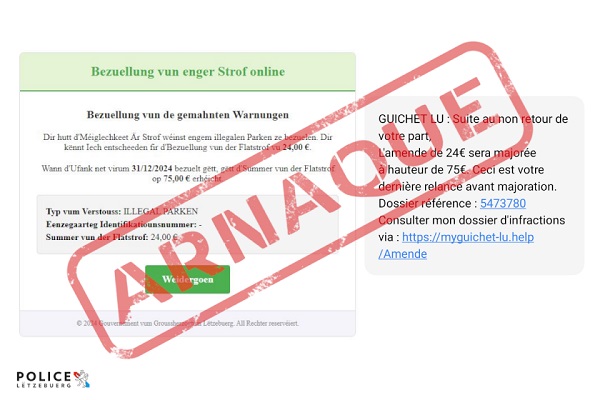 Credit: Police Lëtzebuerg
Credit: Police Lëtzebuerg
The Grand Ducal Police have warned of several scams in recent days.
On Friday 24 January 2025, the police reported that there have been several cases of scammers approaching customers at petrol stations or rest areas under the pretext of being in financial difficulties following a theft, robbery, assault or another incident, and urgently needing cash to be able to return to their home country.
The perpetrators usually speak English and ask their victims for cash, with the promise of paying them back later. The perpetrators are said to often accompany their victims to a nearby ATM to withdraw money.
The police noted that even if the scammers appear to transfer the money in the presence of their victims, this is not actually the case.
Consequently, the police have advised the public to never hand over cash in such cases and to never let strangers accompany them to an ATM. In case of doubt, advise people in need that they should reach out to the police. Such (and similar) incidents should be reported to the police via the emergency number 113.
Moreover, the police said that they have received an increasing number of reports in recent days of people being contacted by supposed bank or LuxTrust employees. These fraudsters have informed people that they are victims of cyber fraud and that unexpected money has been withdrawn abroad. They claimed this means that a bank employee would need the victim's login and credit card details for security reasons; alternatively, the victim has been asked to accept LuxTrust Mobile requests or scan a QR code using the app.
The victims previously clicked on a link sent to them by email or SMS, in which they were asked to enter their login details on a fake website in order to renew their certificate (e.g. CCSS, CNS, LuxTrust) or pay a fine.
After obtaining the login, card or LuxTrust details, the perpetrators withdrew considerable sums of money.
The police thus reiterated that such requests are not the practice of reputable administrations, companies or banks, which will never ask customers to give their cards to strangers or to give out personal information over the phone. If unsure whether it is an attempted fraud, the public are advised not to allow themselves to be pressured and to contact the company or bank in question.
The police also issued the following advice (for scams in general):
- never be pressured by the threat of a fine or an increase in the fine;
- take the time to check a message and, if in doubt, show it to someone else;
- messages that contain typos or have unusual wording may indicate a scam;
- if you unsure whether it is a fraud/scam, contact the administration, institution or company in whose name the false message was sent or the call was made using the usual contact method or channel, e.g. via a contact form or an official email address or telephone number.
The police also asked the public to inform and educate older citizens in their area about this scam.








